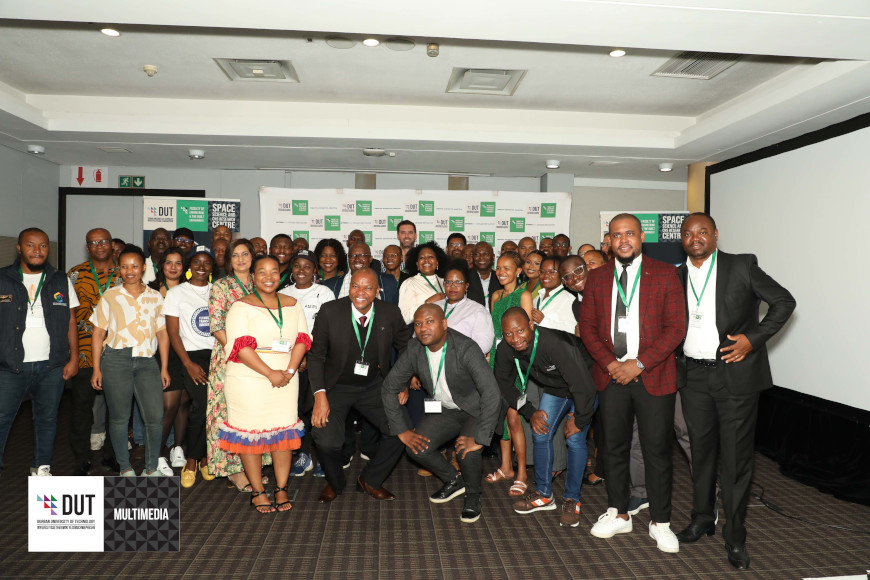The third Space Science and Communication, Navigation, and Surveillance (CNS) Symposium, organised by the DSI-DUT Space Science and CNS Research Centre under the DUT Faculty of Engineering and the Built Environment, was held at the Durban International Convention Centre. The event brought together leading experts, researchers, and stakeholders from various fields to discuss the latest innovations and advancements in space science, with a particular focus on satellite communications, navigation, and positioning.
DUT’s Science and CNS Research Centre programme plays a pivotal role in building national capacity and expertise in satellite communications, navigation, and positioning. Throughout graduate studies and research in Space Science and CNS (Communication, Navigation/e-Navigation, and Surveillance), the programme aims to contribute to South Africa’s economic growth. The research and solutions developed through the programme have significant applications in key sectors such as telecommunications, power and energy, mining, marine navigation, and air traffic management.
The symposium began with an opening address by Professor Sudesh Rathilal, the Acting Executive Dean of DUT’s Faculty of Engineering and the Built Environment. In his speech, Professor Rathilal expressed his excitement about the event and highlighted its significance in promoting collaboration and advancing the field of space science. He underscored the challenges faced by researchers due to the lack of adequate funding and extended his gratitude to the partners who have made the symposium possible. “Research without funding is nearly impossible, and we are incredibly thankful for the support we have received,” he remarked.
Professor Rathilal also emphasised the importance of DUT’s commitment to advancing teaching, learning, research, and innovation. “For our society to move in a positive direction, we must focus on advancing research and innovation, and this symposium is one step in that process,” he added. He expressed optimism for the future, looking forward to the exciting developments that would emerge from the symposium, including new programs and collaborative opportunities.
The keynote address was delivered by Mr. Kaizer Moroka, Deputy Director for the Department of Science and Innovation (DSI). Mr. Moroka defined the concept of the “space economy” as the full spectrum of activities and the use of space resources to create value and benefit humanity. He spoke about the importance of space exploration, research, and the practical applications of space-based technologies, which are crucial not only for advancing scientific knowledge but also for addressing global challenges and driving innovation in various industries.
Mr. Moroka’s address emphasised how space science plays a key role in economic growth, particularly in emerging sectors such as satellite technology, communications, and navigation systems. He called for continued investment in space-related research and innovation as essential components of national development.
Following the presentations, attendees were encouraged to engage directly with the presenters, ask questions, offer suggestions, and share ideas. This interactive format allowed for meaningful discussions and the exchange of knowledge, fostering collaboration between academics, industry professionals, and government agencies. The symposium proved to be a valuable platform for networking, idea generation, and exploring opportunities for future partnerships.
Professor Evans E Ojo delivered vote of appreciation and expressed his gratitude to all the attendees, presenters, and organisers. “I would like to extend my sincere thanks to everyone who has made the third Space science and CNS Symposium success,” he said. “Your contribution has been invaluable, able the presentations provided the symposium us with important insights that we will continue to build upon.” He praised the symposium for fostering a collaborative environment and highlighted the importance of continued dialogue and partnership within the field of space science. He encouraged all the participants to continue their work and remain dedicated to advancing the research and innovations that will shape the future of space science and technology.
In his closing remarks, Professor Katleho Moloi expressed his gratitude to all the attendees and collaborators who contributed to the success of the 3rd Space Science and CNS Symposium. He emphasized that the Envision 2030 strategy, which focuses on research, innovation, and engagement, is key to moving forward. “This is what we need to do,” he said, most of the research presented should be commercialized. He further highlighted the importance of transforming research from theoretical studies into practical, applied solutions.
Pictured: Attendees at the Science Symposium.
Sinamile Sithole

